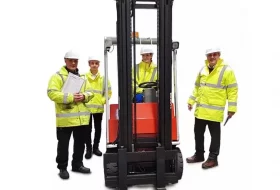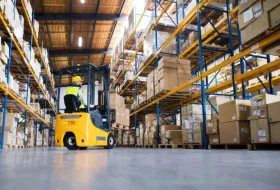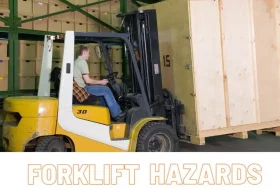Rainy weather or wet ground increases challenges at the workplace and makes forklift operations difficult to execute. These challenges do contain potential hazards. As we all know forklift trucks are the major cause of serious workplace accidents, therefore, forklift safety should never take the back seat. In this blog, we will have a look at important safety guidelines for rainy weather.
What are the major causes of accidents taking place during rainy weather? What can be done to fix them?
Seemingly, distractions and ignorance play their part when an accident takes place. It becomes important to
- Consider weather conditions before heading out in rain with your forklifts. But before that, you need to find if the forklift you are using is manufactured to operate in wet weather. Forklifts powered by electricity aren’t suitable to operate under rainy weather however, LPG or diesel-based forklifts can be easily maneuvered under wet weather conditions. Electric forklifts hold a high chance of electrocution if their outlet is exposed to water or has poor wiring.
- Check if your truck needs any kind of repair. Ignorance might result in unfavourable consequences.
- Drive slowly, especially during odd weather conditions. Because braking at high speed on wet surfaces becomes more difficult than normal surfaces. It is much like driving a car in the snow or slicker surface, you need to maneuver with the same care.
- Ensure you are well-equipped with the safety gear. During rainy or wet conditions, forklift operators need to wear the appropriate safety gear to avoid any mishap. Safety gloves and hats are must-haves to keep you safe and working. If there is excessive rain, you can prefer to wear zippered coats and well-ventilated gear.
- Ensure you have a proper lighting system in your forklift as unexpected potholes at your workplace can be deadly. Not only do water-filled potholes cause the obstruction, but there’s much more to it. If not immediately identified or fixed, your forklift might turnover. It is always advisable to operate a forklift on clear and obstruction-free land.
- Follow practices that improve visibility during rains. Home-made forklift covers are often utilized by operators to cover themselves from rain. This practice often reduces visibility, causing multiple hazards at the workplace.
The productivity during rainy weather seemingly slows down. What matters the most is working at a safer pace than trying to execute operations at a faster pace. Safe and slow work execution is better than facing hazardous consequences. Always ensure you are working at a much safer workplace to avoid potential injuries or fatalities.
If you are a forklift operator, you must have dealt with forklift operations under different circumstances. Your daily operations must involve driving under different terrains. To be able to drive efficiently on different surfaces makes you become a well-experienced forklift operator. Being aware of the outdoor conditions can help you take precautionary measures while operating your forklifts.
We provide cutting-edge forklift operator training in Toronto to groups of all sizes and individuals. If you want to establish your career as a forklift operator, we have qualified instructors to help you understand and learn the essentials of managing a forklift under different weather conditions and distinct workplace environments. Call to know more.




